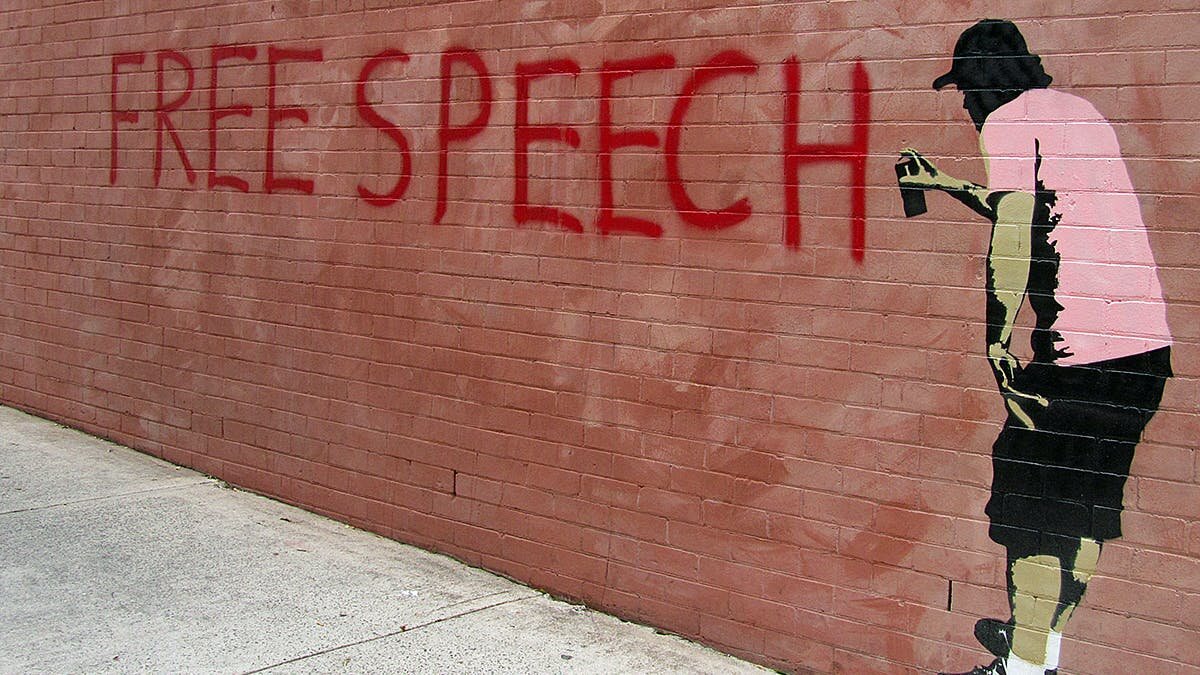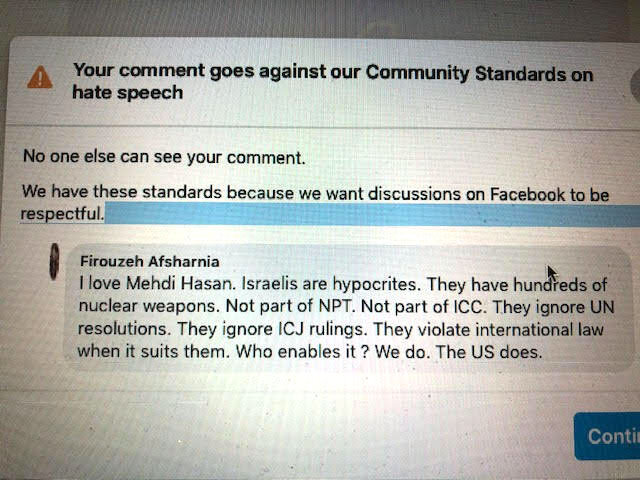
Firouzeh Afsharnia
These days, Americans and Europeans who criticize Israel for its policies and policing of Palestinians are themselves facing censorship, as more and more often, they find themselves accused of anti-Semitism, or “hate speech”. In the United States, the ACLU and the Center for Constitutional Rights are among several organizations fighting this assault on the First Amendment. On the other side of the equation are dozens of city and state governments, academic bodies and now, Facebook.
“Your comment goes against our community standards on hate speech.”

The message popped up on Facebook when I tried to post a response to an Aljazeera interview in which Mehdi Hasan challenged Danny Ayalon, the former Deputy Foreign Minister of Israel, on the nuclear ambitions of Iran, and whether it is an existential threat to the region.
I posted a response on my page: “I love Mehdi Hasan. Israelis are hypocrites. They have hundreds of nuclear weapons. Not part of NPT. Not part of ICC. They ignore UN resolutions. They ignore ICJ rulings. They violate international law when it suits them. Who enables it? We do. The US does.”
Mehdi Hasan challenged Israel’s alarmist rhetoric that for over 20 years, Iran has been alleged to be only two to three years away from having a nuclear bomb. He half-jokingly called Netanyahu worse than the boy who called wolf; never mind the fact that it is Israel that harbors an illicit nuclear program, and Israel which has defied UN Security Council resolution 487 calling for “Israel to urgently place its nuclear facilities under the safeguard of IAEA” and which has several hundred undeclared warheads. “So what?!” was Ayalon’s response.
Ayalon asserted that Iran is a threat to everyone in the region, unlike Israel which has never invaded or aggressed a single country in the region—an eye popping claim considering the millions of Palestinian refugees stranded in neighboring countries and dispossessed from their homeland. A simple Google search will document Israel’s aggressions against virtually all its neighbors (certainly Egypt, Jordan, Lebanon and Syria) under the justification of securing its survival. As Avi Shlaim, another of Mehdi Hasan’s guests noted during the conversation, “Iran is not an existential threat to Israel but it is a strategic threat. Now, let’s compare the records of these two countries, Iran has never attacked a neighbour, Israel has repeatedly attacked its neighbours, Iran signed the non-proliferation treaty, Israel has refused to sign.”
Israel’s constant warnings about Iran constitute a smokescreen, for Israel’s record is unequivocal in the eyes of the international community. Just look up the list of United Nations resolutions concerning Israel. As of 2013, Israel was condemned in no less than 45 resolutions by the United Nations Human Rights Council.
Among others, UN Security Council Resolution 2334 states that Israel’s settlement activity is a “flagrant violation of International Law” while the International Court of Justice (ICJ) called the construction of the separation wall that cuts into Palestinian territories illegal. Resolution 242 calls for Israeli withdrawal from territories occupied in 1967, and UNGA resolution 3379 in 1975 determined that Zionism is a form of racism and racial discrimination—one that was later rescinded under the strong arming of Israel and United States (surprise!) As for the International Criminal Court, Israel is predictably not a signatory. Why pile up more condemnations you plan to ignore?
By now, it is common knowledge that Israel plays by its own rules, shielded by the lone veto on the Security Council and accountable to no one. But the systematic quashing of criticism and the concerted effort to reframe the narrative takes it to a level that flies in the face of free speech and democratic norms that both the U.S. and Israel claim to uphold.
The fact that we can openly talk about the U.S. genocidal past, criticize the treatment of African Americans and freely discuss whether US imperial adventures around the world have left behind carnage—but cannot make the slightest allusion to Israel’s serial flouting of international law and violation of human rights for fear of being smeared as anti-Semitic or actively engaged in hate speech, is a testament to the formidable army of vigilante organizations, lobbies and the extensive political influence it wields in Washington as well as in Silicon Valley.
The fact is that today, Israelis in Israel have more freedom to criticize their government’s treatment of the Palestinians than Americans do in our own country.
Facebook is now collaborating with the Israeli government, represented in part by the extremist Justice Minister, Ayelet Shaked, who does not believe in a Palestinian state, to determine who should be censored and whose accounts should be deleted.
According to her, 95% of the 158 requests were granted.
In A Promised Land, his latest book, Barack Obama speaks of the asymmetrical power of AIPAC, and Israel’s influence in Washington that muzzles any criticism of Israel and distorts the policy on Iran. He states that inside the Democratic Party “even stalwart progressives were loath to look less pro-Israel than Republicans”; and that “those who criticized Israeli policy too loudly risked being tagged as ‘anti-Israel’ (and possibly anti-Semitic) and confronted with a well-funded opponent in the next election.” Israeli activism in Washington is responsible for the Trump Administration’s withdrawal from the Iran nuclear deal (JCPOA) and its crushing sanctions campaign, which has sunk over 75 million people into poverty. According to leaked intelligence reports, sanctions “have left Iran bereft of financial resources to mount an effective public health response [to Covid-19].”
Criticism of Israel and its heavy-handed policies is systematically fencing in academics, including demands that events be canceled or speakers be banned. Groups like Canary Mission specifically target and blacklist activists on college campuses. More than 100 bills penalizing boycotts of Israel have been introduced in state and local legislatures in recent years, and 24 states have acted specifically to target BDS, the Boycott Divestment Sanctions movement. Congress has introduced a bill to withhold federal funding to institutions where Israel is criticized as evidence of “anti-Semitism”. The ACLU calls it “part of a disturbing surge of government-led attempts to suppress the speech of people on only one side of the Israel-Palestine debate.”
The height of absurdity was demonstrated in Dickinson, Texas, where in 2017 victims of Hurricane Harvey were required to pledge not to boycott Israel as a condition of receiving relief aid.
My response on Facebook in the week Israel brazenly assassinated yet another scientist in a sovereign country was one among thousands of comments with no effect on policy or public opinion, even as official narrative is daily crafted to push for a dangerous confrontation with Iran.
So we have to ask ourselves, what is the end game? Assassinations were once seen as the hallmark of terrorists and jihadists—of the likes of the PLO and the IRA. How far is Israel, enabled by the U.S., willing to go in order to crush adversaries and silence critics of its rogue policies? Where does it end? Concerning Iran, war might be the inevitable outcome. As for the Palestinians, a few words come to mind but I should probably avoid mentioning them. After all, you never know who might be monitoring you.
TMR supports the Universal Declaration of Human Rights and as such reserves the right to allow its contributors to criticize any country, including (for example) Israel, the USA and Saudi Arabia. We have no sacred cows here. We honor freedom of expression above all else. That said, the views expressed by independent columnists do not represent the official policy of TMR.

Firouzeh Afshania was born in pre-revolutionary Iran and came to the U.S. to study Business Administration at Boston University. She holds an MBA from the University of Southern California and a Master of International Service with a focus on Conflict and Africa from the American University in Washington D.C. She was part of the United Nations Peacekeeping Mission in DR Congo where she was also based. She has traveled and worked extensively in Africa, consulted for the World Bank and served on several election observation missions with The Carter Center in Nepal, DRC and Ivory Coast. She lives and writes in Los Angeles.




